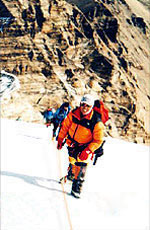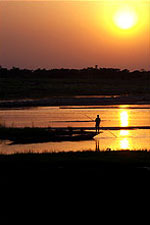- Trekking in Nepal
- Trek Itinerary
- Equipment Checklist
- Useful Info on Trekking
- Trekking Season Guide
- Trekking Grade
- Trekking Permit
- Cultural Trek/Tour
- New Trekking Areas
- Peak Climbing in Nepal
- Mountaineering Info
- Tibet Tour/Trek
- Useful Info on Tibet
- Sikkim & Darjeeling
- Bhutan Tour
Other Activities
Useful information for Trekking in Nepal:
Daily trek routine during Treks:You are on holidays and our Trekking Team will do their best for your to enjoy it maximum! Whatever questions you may have - you are always welcomed to discuss all with the guide.
Camping Trek:
You will awaken up with a cup of tea brought to your tent at 6.00AM followed by a small bowl of hot water for you to wash. Before breakfast, you should pack up your gear, bearing in mind that your sleeping bag will also have to fit into the duffel bag. Roll up your mattress, put it in a stuff sack, and ensure your tent is free of rubbish and personal belongings.
Your duffel bag will be taken by your Sherpa and tied up with other gear into a load, which heads off early with the porters. This will be available to you at the next camp. We usually hit the trail by 7.30 AM and stop for lunch around 12 O'clock. Lunch is usually about one and half-hours. This allows sufficient time to serve meals to the group members. The afternoon walk will be shorter and we camp around 4 to 5 PM. Please keep in mind that these times are general conditions - weather, availability of suitable camp-sites and water supply may effects them greatly at any time. The evening meal is served around 6.30 to 7.30 PM inside the dining tent. A pressurized kerosene lantern lights our tent. Food is served on tables while we sit in camp chairs. After dinner your guide will brief everyone on the next days trekking. Then you can retire to your comfortable sleeping tents, step out to watch the stars or socialize in the mess tent. Food on the trek is plentiful, hygienic, wholesome and varied. Enough staple products are carried for the entire outing. While fresh supplies of vegetables, eggs and meat will purchase locally if and whenver it's possible. Every camp has a simple but hygienic toilet-tent and shower tent for longer treks.
Food and Water during Trekking on the Himalayas:
Camping Treks:
Water:
We highly advise to minimize use of plastic during the trek. Please always remember that there is no any plastic recycle facilities up in the Mountains. We advise to have your own water bottle with you for the whole trek which you can refill at the campsite in the evening and morning or at lunch break on the way.
Our trekking staff take maximum care with water hygiene. Water is boiled properly before preparing tea or coffee. We advise not to drink not boiled water from tea shops. Our camp staff will re-fill your water bottles during breakfast and dinner times with properly treated water.
Food:
Food on camping treks is wholesome and freshly prepared for each meal. We rarely serve canned food, it is only used on long treks.
Tea - House/Lodge Treks:
Water:
We highly advise to minimize use of plastic during the trek. Please always remember that there is no any plastic recycle facilities up in the Mountains. In this regard we highly recommend you to use boiled water for drinking or use water purification tables instead of buying water in plastic bottles. Your Trekking Guide will suggest you the best and most ecological friendly way for drinking water during a trek depending on a trek area.
We advise to have your own water bottle with you for the whole trek which you can refill at the lodge/campsite in the evening and morning or at lunch break on the way.
Food:
For Tea - House Treks food will be provided at the tea - house /lodge on menu.
Altitude:
Acclimatization is important for the trekking above 3500m. Our trekking schedules have been carefully designed to maximize your ability to acclimatize safely. We ascend slowly and ensure an adequate number of rest days. However, it is still possible for mountain sickness and your tour leader or Sirdar will be watching for symptoms with an experienced eye throughout the trip. These symptoms are commonly headache, nausea, lethargy and sometime breathlessness. If you or any of the group members display any of these symptoms he will be able to provide informed advice and ensure a proper course of action. Your tour leader will advise you more thoroughly regarding the altitude and most of the problems prior to starting on trail.
Comparative Oxygen Varied Rate in Different Altitude Level
List of Altitude Level and Oxygen Rate
- 8,848m/ 29,028 feet : 33%
- 8,000m/ 26,247 feet : 36%
- 7,000m/ 22,966 feet : 41%
- 6,000m/ 19,865 feet : 47%
- 5,500m/ 18,045 feet : 50%
- 5,200m/ 17,061 feet : 52%
- 5,000m/ 16,404 feet : 53%
- 4,500m/ 14,764 feet : 57%
- 4,000m/ 13,123 feet : 60%
- 3,500m/ 11,483 feet : 64%
- 3,000m/ 9,843 feet : 68%
- 2,500m/ 8,202 feet : 73%
- 1,000m/ 3,281 feet : 88%
- 760mmHg (Sea Level) : 100%
Insurance:
We suggest you to obtain insuarance for your trek back home. Please note that your medical insurance policy should cover helicopter evacuation, many policies leave this out so be sure to check yours. The fee for such an evacuation can amount to US$ 2000.00 per hour.
First aid kit:
We provide a first aid kit on our group treks. We suggest you bring the following supplementary items with you:
Anti-diarrhea tablets, blister pads, sterile plain and crepe bandages, tube of antiseptic cream, decongestants/antihistamines, throat lozenges, paracetamol or aspirin and personal medicines as prescribed by your physician.
Trekking permit:
A valid permit is required for certain areas, which we will obtain upon your arrival. We will require two working days and two passports size photographs. Permits are not required for the Annapurna, Everest and Langtang treks. However, conservation fees are required for these national parks.
Disposal of rubbish:
We recommend that each trekker have keep a small bag during the course of the trip. Each morning a small fire is lit for burnable rubbish. Any non-burnable or non-biodegradable rubbish should be carried back to Kathmandu and disposed appropriately.
Money and valuable securities:
Always carry Nepalese rupees in small bills on your trek. The amount to be cared depends on the area and the duration of the trek. A guideline for this will be presented during our trek briefing. Money will only be required for the purchase of soft/hard bottled drinks (or food as well depending on what your trekking plan includes), tips and souvenirs along the way. Other money and valuables should be kept in a safe deposit box in your hotel in Kathmandu.
Facilities on the Trail:
Medical Facilities available in the Popular Trekking Routes:
Everest Region:
Lukla: Government Health Post - Health Assistant
Namche: Dental Clinic - Dental Doctor
Khunde: Hospital - Doctor (Hillary Trust)
Pherche: HRA aid - post Doctor
Annapurna Region:
Bensi sahar: Government Hospital - Doctor
Chame: Government Hospital
Manang: HRA Aid - post Doctor / ACAP Health Post - Health Assistant
Muktinath: Government Health Post - Health Assistant
Jomsom: Government - Hospital
Ghorepani: Government Health Post - Health Assistant
Lantang Region:
Dhunche: Government Hospital Doctor
Syabru: Government Health Post
Communication facility avalable at popular trekking routes:
Region & Telephone number:
Bensi sahar 066 - 29309
Khudi 066 - 29320
Bahun Danda 066 - 29344
Bhulbule 066 - 29335
Dhara Pani 066 - 49366
Chame 066 - 49333 CDO / 066 - 49399 DSP
Manang 066 - 49311 / 066 - 49322 PCO
Muktinath 069 - 29417 PCO
Kagbeni 069 - 29413 / 29430 PCO
Jomsom 069 - 29410 / 069 - 29416, 019 - 41001 Sattelite Outline, 019 - 41002 Sattelite Receiving Line
Marpha 069 - 29412 PCO
Lete 069 - 29414
Tato Pani 069 - 29412 PCO
Tukuche 069 - 29415
Ghore Pani 069 - 29320
Ghandrung 061 - 29322


















